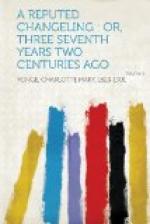“I should like my boy to be fetched,” said Charles. “I should wish him to remember his father—not as a felon convicted!” Then putting a knee to the ground before Sir Philip, he said, “Sir, I ask your blessing and forgiveness. I never before thoroughly understood my errors towards you, especially in hiding this miserable matter, and leaving all this to come on you, while my poor Anne there was left to bear all the load. It was a cowardly and selfish act, and I ask your pardon.”
The old man sobbed with his hand on his son’s head. “My dear boy! my poor boy! you were distraught.”
“I was then. I did it, as I thought, for my poor Alice’s sake at first, and as it proved, it was all in vain; but at the year’s end, when I was older, it was folly and wrong. I ought to have laid all before you, and allowed you to judge, and I sincerely repent the not having so done. And Anne, my sweetest Anne, has borne the burthen all this time,” he added, going back to her. “Let no one say a woman cannot keep secrets, though I ought never to have laid this on her.”
“Ah! it might have gone better for you then,” sighed Sir Philip. “No one would have visited a young lad’s mischance hardly on a loyal house in those days. What is to be done, my son?”
“That we will discuss when the lawyer fellow comes. Is it old Lee? Meantime let us enjoy our meeting. So that is Lucy’s husband. Sober and staid, eh? And my mother is feeble, you say. Has she been ill?”
Charles was comporting himself with the cheerfulness that had become habitual to him as a soldier, always in possible danger, but it was very hard to the others to chime in with his tone, and when a message was brought to ask whether his Honour would be served in private, the cheery greeting and shake of the hand broke down the composure of the old servant who brought it, and he cried, “Oh, sir, to see you thus, and such a fine young gentleman!”
Charles, the only person who could speak, gave the orders, but they did not eat alone, for Sir Edmund Nutley and Sedley arrived with the legal advisers, and it was needful, perhaps even better, to have their company. The chief of the conversation was upon Hungarian and Transylvanian politics and the Turkish war. Mr. Harcourt seeming greatly to appreciate the information that Colonel Archfield was able to give him, and the anecdotes of the war, and descriptions of scenes therein actually brightened Sir Philip into interest, and into forgetting for a moment his son’s situation in pride in his conduct, and at the distinction he had gained. “We must save him,” said Mr. Harcourt to Sir Edmund. “He is far too fine a fellow to be lost for a youthful mischance.”
The meal was a short one, and a consultation was to follow, while Sedley departed. Anne was about to withdraw, when Mr. Lee the attorney said, “We shall need Mistress Woodford’s evidence, sir, for the defence.”




